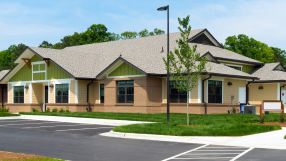Recovering Champions
279 Brick Kiln Road
Falmouth, MA 02536

About Recovering Champions
Located in Falmouth, Massachusetts, Recovering Champions is a drug and alcohol addiction treatment center for adults. The center offers day treatment, partial hospitalization programs, outpatient programs, intensive outpatient programs, dual-diagnosis treatment, medication-assisted treatment (MAT), family counseling, and aftercare.
Situated in scenic Cape Cod, Recovering Champions provides the perfect setting and the clinical expertise to support individuals in overcoming substance use disorders and co-occurring mental health conditions. The clinical team combines evidence-based treatments with holistic therapies, such as MAT, cognitive behavioral therapy, 12-Step facilitation, and relapse prevention. The MAT program involves the use of FDA-approved medications with behavioral counseling to treat opioid use disorders. It is a highly effective, evidence-based treatment endorsed by the National Institute on Drug Abuse as the gold standard of treatment.
The center’s amenities include modern upscale facilities with comfortable accommodations, indoor and outdoor lounge areas, swimming pool, recreational facilities, and credentialed clinical staff.
Recovering Champions is accredited by the Joint Commission and LegitScript certified. Most commercial insurance is accepted. Self-pay options and payment plans are available.
Amenities

Art Therapy
Art and music are mediums that connect with our feelings, making them a great recovery tool during addiction t...reatment. Studies show that combining art/music and drug rehab can have a greater therapeutic impact than drug rehab alone, as you’re able to access parts of your brain and body that you may not have access to during traditional talk therapy. Benefits of art/music therapy include lowering stress and anxiety, promoting healthy neurochemicals, and providing stress relief.
Adventure Therapy
Hiking is a great way to relieve stress, get perspective, navigate challenges, connect with nature, and improv...e your health - all essential components of sustaining long-term recovery. Studies also show that the body releases endorphins during physical activities like hiking. These endorphins improve mood and act as a natural pain reliever.
Luxury Rehab
Luxury rehab is a form of treatment offered in a residential, resort-style setting. You’ll receive personali...zed treatment from staff and clinicians, have access to forms of treatment that go beyond what a typical inpatient rehab offers, and offer specific amenities like ocean views, large single occupancy bedrooms with private baths, and complementary spa treatments like massage, acupuncture, or reiki. Most luxury rehab centers have a limited number of beds.
Meditation Room
Yoga and meditation are great activities to support your recovery process during alcohol or drug rehab. These ...therapies have been around for centuries, and they are an effective way to improve well-being. Combining addiction treatment, yoga, and meditation can reduce cravings, improve sleep, relieve anxiety and depression, provide stress relief, promote relaxation, support emotional healing, and improve energy levels.
Music Room
Music can be extremely therapeutic, serving as a valuable healing tool and an integrative feature of a holisti...c treatment plan. A music room offers a large number of outlets, including singing, playing musical instruments, and listening to music.
Private Rehab
Private drug rehab provides a comfortable, secure environment that allows you to focus on doing the work to ge...t your life back on track. Benefits include a higher staff-to-client ratio, increased one-on-one time with therapists and healthcare providers, private rooms for clients, and customized forms of therapy.
Residential Setting
Residential drug rehab provides the comforts of home with the therapeutic support needed to successfully recov...er. Benefits of an inpatient program include increased safety, a higher success rate, and the time and distance given to focus on recovery. Residential drug rehabs are often the preferred method of treatment, as they can be tailored to meet specific needs, offer focused therapeutic care, and provide the necessary tools to sustain recovery.
Yoga Studio
Treatment centers with a yoga studio offer a special form of holistic therapy during the recovery process. Yog...a boosts mindfulness, a sense of calm, and healthy reflection during drug rehab via breathing exercises, stretching, and a progression of specific postures.Addiction Treatment Programs
Adult Program
Each adult program in Massachusetts is designed to help individuals over the age of 18 recover from addiction to drugs or alcohol. The length of the program and its intensity varies, based on the needs of the individual.Alcoholism
Most alcohol rehab in Massachusetts consists of individual counseling and group therapy sessions, which address mental and emotional concerns that are contributing to alcohol use. Treatment helps participants make changes to maintain sobriety and prevent relapse.Men's Rehab
For men who want to stop drinking or using drugs, men’s rehab in Massachusetts offers help and hope. These treatment programs, designed specifically for men, help participants recover and rebuild their lives.Opioid Treatment
When you enter opioid rehab in Massachusetts, you’ll receive treatment in a supportive environment that encourages recovery. After successful withdrawal management, you’ll participate in a variety of evidence-based therapies that prepare you for long-term sobriety.Women's Rehab
Women who are seeking treatment for substance use disorders can receive various levels of care at women’s rehab in Massachusetts. Programs include detox, partial hospitalization programs (PHP), intensive outpatient programs (IOP), telehealth programs, sober living, outpatient, and aftercare.Teen & Adolescent Program
Teen and young adult substance abuse can set individuals on a life-long path of destruction. A young adult program in Massachusetts can intervene in young adults’ lives to set them on a better path during this crucial stage of life.Levels of Care
Detox & MAT
The first step to a drug-free future is detox. This involves slowly and safely ridding your body of all addict...ive substances, under 24/7 supervision. This is typically the initial phase of drug rehab in Massachusetts.Inpatient Rehab
As the most intensive treatment setting, inpatient drug rehab in Massachusetts treatment involves 24/7 supervi...sed care. At this level of care, you typically participate in individual, group, and family therapy sessions, and you may receive medication and additional recreational therapies.Outpatient Rehab
Massachusetts outpatient rehab does not have a defined timeline. The program is tailored to meet your recovery... needs, and may last 90 days or a year or more. During this time, you will attend therapy sessions and support group meetings, for ongoing accountability and development of sober-living skills.Aftercare & Alumni Program
Aftercare rehab in Massachusetts gives you continued access to support after rehab. You may need assistance wi...th job coaching, budgeting, education, or accountability as you re-enter your life. Aftercare programs provide these supports, so you can face challenges and maintain a sober lifestyle long-term.Dual Diagnosis & Mental Health
If you meet the diagnostic criteria for two or more conditions, you have a dual diagnosis. Massachusetts dual ...diagnosis treatment is designed to address both conditions simultaneously, for improved recovery outcomes.Sober Living
In Massachusetts sober living, you will take on more responsibility than rehab treatment requires. You’ll pa...y rent and work or attend school. You’ll also contribute to household chores. The goal is to learn how to live independently, free from drugs and alcohol.Accreditations

LegitScript Certified

Joint Commission
Insurance
 Financial Aid
Financial Aid
If you're struggling to pay for treatment, financial aid may be a solution for you. This can provide access to... all levels of care. Financial assistance options include grants, scholarships, non-profit programs, personal funding, and health insurance programs to help you manage the expense of substance abuse treatment.
 Private Insurance
Private Insurance
If you have private insurance, you can use it to help cover the cost of treatment. Most rehab insurance polici...es tend to have different coverage rates and costs that policyholders are responsible for paying, so check with your insurer for detailed information.
 Self-Pay Options
Self-Pay Options
If you prefer to take control of the cost of your treatment, you can opt to pay for it yourself through self-p...ay options, also known as private pay. This option provides access to all levels of care — from detox to inpatient rehabilitation — because you’re not limited by the rules of insurers or state-run programs.Contact Recovering Champions

Location Details
Other Nearby Facilities

120 Turnpike Rd #110
Southborough, MA 01772

75 Lindall Street
Danvers, MA 01923

55 Brook Street
Plympton, MA 02367

36 Miller Stile Road
Quincy, MA 02169